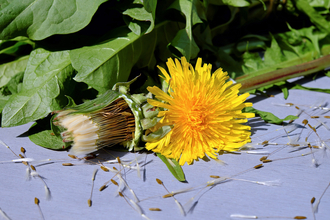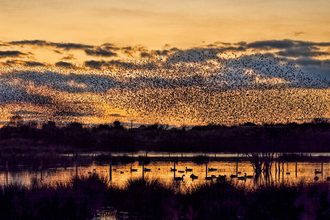The Wildlife Trusts have joined more than 60 nature, planning, health and equality organisations to launch a new ‘Nature For Everyone’ campaign, calling for a ‘legal right to nature’ to be a key component of the Government’s Levelling Up reforms.
The calls follow the recent publication of the Levelling Up White Paper, by the Department for Levelling Up, Housing and Local Communities. The coalition behind the campaign have today launched a petition and written to Secretary of State Michael Gove calling for Government to:
- make equal access to thriving natural spaces a key measure of success for Levelling Up
- set legal duties in Levelling Up legislation for developers and public bodies to provide equal access to nature-rich green and blue spaces for everyone
- provide funding for locally-accessible nature-rich spaces including extending the Levelling Up Fund to green and blue infrastructure projects.
New research from Wildlife and Countryside Link on access to nature, has also been published. This shows: a huge public demand for more and better natural spaces; the massive benefits this could have for our communities (particularly the most deprived and excluded); and the need for national and local leaders to deliver.
Improving and creating natural spaces would give particularly big benefits to those on low incomes and ethnic minorities, who are most likely to live in nature deprived areas. The poor-quality of many existing parks and other natural spaces is a huge problem. The new findings reveal 81% of those living in nature-deprived areas would be more likely to visit local natural spaces if they were in better condition, and 7 in 10 (68%) would be likely to exercise more with better nature access.
There is strong evidence that accessible nature-rich spaces boost our physical and mental wellbeing, and reduce mortality. Yet one in three people in England cannot access nature near their home. This is a particular issue for our poorest communities and ethnic minorities who are twice as likely to live in a neighbourhood without nature-rich spaces. At the same time, wildlife is declining across the UK, with the UK in the worst 10% of countries worldwide for nature loss.
Why is access to nature so important?
We should all be able to experience the joys and benefits of wildlife in our daily lives.
Evidence shows that even seeing nature through a window has a positive impact on our health. Creating more, and better, natural spaces and protecting and improving those we already have, will boost our mental and physical wellbeing, delivering billions of pounds in cost savings to the NHS and creating thousands of jobs.
This is also critical for the future of nature. The Government has a legally-binding commitment to halt the decline of wildlife by 2030, but much more action is needed. Wildlife is in long-term decline and we will never be able to restore nature if so many communities are left bereft of natural spaces.
When duties on developers and public bodies to bring nature to people’s doorsteps are included in new Levelling Up laws, it will help to guarantee access to nature for all.
What’s this got to do with Levelling Up legislation?
The planning system is central to delivering accessible natural spaces where we live. Planning reforms will be featured in new Levelling Up legislation and offer us a vital opportunity to ensure equality in everyone’s access to nature.
Legally-binding duties on developers and public authorities are crucial. They will ensure all government departments consider people’s access to nature when making plans and decisions and work towards delivering equal access. It will also enable Local Authorities to deliver the thriving local nature spaces that communities need and mean developers will consider nature more, when considering plans for development and preparing their proposals.
What is wrong with the current system?
A huge local authority funding gap is largely to blame, with an estimated £190 million lost from local authority parks budgets alone since 2016. But Local Authorities don’t currently have strong enough legal requirements and enforcement duties to hold developers to account, or enough resources to create more and maintain local natural spaces.
Many existing neighbourhoods don’t have good nature access, and when developers do include natural spaces in new developments these are often small, badly planned and not well-maintained. Add to this that all too often, the public natural spaces we have are run-down and unpleasant places to visit.
Local Authorities need new legal duties they can enforce and resources from the Levelling Up fund to deliver the natural spaces that will benefit local communities, wildlife, and the NHS.
Why is access to nature currently so unequal?
The most disadvantaged and excluded neighbourhoods are the least likely to have accessible nature-rich spaces within a short distance of people’s homes, and the most likely to have parks, waterways and other natural spaces in poor condition. Poor planning and design means nature often wasn’t incorporated at the start, and barriers like poor transport links, lack of walkways or safe crossings make accessing the natural spaces that there are close by difficult.
This lack of access to thriving nature is compounded by safety concerns and societal barriers {such as: lack of awareness of, or confidence in natural spaces; social isolation; experiences or worries of harassment or abuse; and lack of inclusive design of natural spaces) which prevent people from feeling comfortable and welcome in shared natural spaces.
If the Government is serious in Levelling Up quality of living and opportunity it must start by improving the state of nature in the most disadvantaged neighbourhoods, and the infrastructure behind them, helping to improve the health and well-being of thousands of communities.
What can I do?
Show your support for more access to nature for everyone - you can sign our petition here and share it with your friends so they can get involved too.
Back the campaign!
Tell the Government that everyone, everywhere should have equal access to nature:



